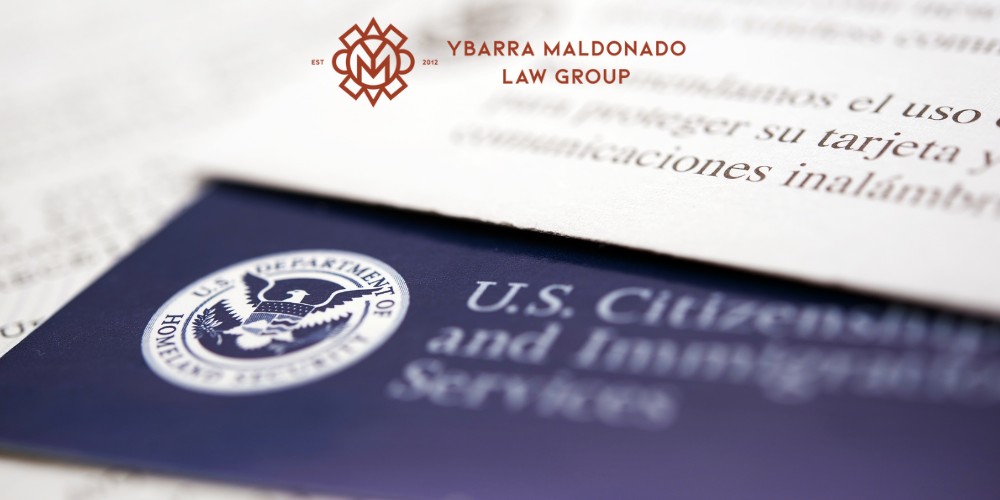EXTREME HARDSHIP WAIVER
DON’T HESITATE TO REACH OUT TO US!
Our Law Firm is committed to becoming the best Law Firm for Latino, migrant, and Spanish speaking communities in Arizona.
How to Prove Extreme Hardship in Your Immigration Case

Many people attempt to get green cards or visas, but they are barred from this on the grounds of inadmissibility under U.S. immigration law. However, you may be able to legally work around this if you qualify for an extreme hardship waiver. Eligibility depends on several factors, including whether or not you have any qualifying relatives who may suffer extreme hardship. The best way to determine whether or not you qualify for an extreme hardship waiver is to speak with an experienced Phoenix immigration attorney.
At Ybarra Maldonado Law Group, we understand how stressful it can be to find out that you are considered inadmissible to the United States. Luckily, our in-depth knowledge of immigration law allows us to help family members stay together. Proving extreme hardship can be difficult without the right support. Let our attorneys help you navigate the complexities of USCIS processes and immigration law. To schedule a case evaluation with us about your case, please call our Phoenix law office at 602-910-4040 today.
Who Qualifies to Request a Waiver of Inadmissibility?
The Immigration and Nationality Act outlines many reasons why a person may be inadmissible to the United States. If someone attempts to immigrate to America and they are deemed inadmissible, this can feel like a crushing blow. However, many green card and visa applicants can qualify for a waiver of inadmissibility, even if they have committed certain violations.
Many types of waivers exist, and each waiver has its own requirements and restrictions. Below, we outline each waiver’s approval requirements.
- I-601 waiver: The person must have a spouse, parent, or fiance who is a lawful permanent resident or citizen of the United States. This family member would experience extreme hardship if you were not admitted to the country. Children who are lawful permanent residents or citizens do not count as qualifying relatives for this type of waiver.
- I-601(A) waiver: Applicants must apply from within the country before leaving it. This waiver is only available for those who are considered inadmissible due to unlawful presence. This can also be called an unlawful presence waiver.
- 212(H) waiver: This is the waiver to use if someone is found inadmissible due to a criminal conviction. Certain minor crimes can be waived. To qualify, the crime must have happened over 15 years ago, or you have a child, spouse, parent, or fiance who is a citizen or lawful permanent resident. You must also show that the qualifying relative meets the extreme hardship standard.
- 212(c) waiver: You qualify for this waiver if you are a lawful permanent resident who pled guilty to a criminal conviction before April 1, 1997. This form allows you to avoid removal proceedings based on that criminal conviction.
- INA 237 A1H waiver: You qualify for this waiver if you are deemed inadmissible based on misrepresentation or fraud. As with other waivers, you need to show that a qualifying relative would suffer extreme hardship if you could not immigrate to the United States. However, those who made false claims to citizenship do not qualify.
What Is Extreme Hardship in Immigration Law?

Now that you know an extreme hardship determination is necessary for many forms and waivers, it’s important to understand what exactly that means. The United States Citizenship and Immigration Services defines extreme hardship to mean hardship that is greater than what a qualifying relative would experience on a normal basis if the intending immigrant were barred from entering the country. Extreme hardship requires more than just family separation. There is no specific rule or law that defines the “extreme” versus “normal” circumstances.
However, working with a skilled immigration lawyer can greatly increase your chances of a positive outcome. We will help you adequately prepare and gather evidence to support your right to immigrate and be with your family members. In the following sections, we outline how to demonstrate extreme hardship.
Examples of Extreme Hardship
Each case is unique when it comes to demonstrating extreme hardship. In order to have a better understanding of whether or not your situation qualifies for an extreme hardship waiver, we recommend speaking with an attorney. Below, we list several examples of situations that may qualify as extreme hardship.
- The applicant has multiple children who cannot speak the language of the applicant’s home country. Therefore, the children would need to learn a foreign language.
- Their parent is a United States citizen who is too old or sick to relocate to be near the applicant, and the applicant is their primary caretaker.
- The applicant financially supports their family, and they are unlikely to find work in their home country.
- The applicant is a member of an ethnic minority group that is suffering persecution in their home nation.
- Their home country is currently experiencing terrible economic hardship or political upheaval.
This is far from an exhaustive list of what situations may qualify for an extreme hardship waiver. If a family member were to suffer significant emotional hardship, for example, this may qualify as extreme hardship.
Who Is a Qualifying Relative for Extreme Hardship?
Qualifying relatives are generally children, parents, spouses, or fiances. They must be a United States citizen or lawful permanent resident parent or spouse if the intending immigrant is denied entry due to fraud, misrepresentation, or unlawful presence. If the intending immigrant is denied entry based on a past criminal conviction, the qualifying relative must be a spouse, child, or parent who is a citizen or an LPR. A United States citizen fiance would also count as a qualifying relative.
What Is Extreme Hardship if Deported?
In many cases, immigrants want to avoid deportation with extreme hardship factors. In other words, their removal would result in extreme hardship for themselves or their family members. It is not enough to say that a family member would miss the applicant if they were deported. There must be something else very significant at play.
What Is an Extreme Hardship Waiver?

An extreme hardship waiver is one that asks the United States government to either stop removal proceedings against someone or to allow them into the United States. Those who use these waivers have already been deemed inadmissible, but if they were unable to be in the United States, the applicant, the applicant’s spouse, or other family members would endure extreme hardship.
Although most extreme hardship cases will use Form I-601, there are several other hardship waivers as well. Depending on your specific situation, you may need to use one of the other immigration waivers.
How to Qualify for Extreme Hardship
The USCIS has specific requirements for those who want to qualify for extreme hardship. The general legal requirements for extreme hardship include the following.
- Your removal or your bar from entering the United States would cause hardship to your qualifying relative. Remember that this hardship must go beyond what they would normally experience in your absence.
- You have a qualifying relative who is a United States citizen or a lawful permanent resident.
- You are not required to use your immigration sponsor as your qualifying relative. If your parent is the one who sponsored you, you can use your child or spouse as the qualifying relative.
- The person who would suffer extreme hardship is the qualifying relative, not the applicant. It is a common misconception that one can qualify for an extreme hardship waiver if they themselves would suffer the hardship.
How to Prove Extreme Hardship
Because extreme hardship is an incredibly subjective term, it can be difficult to understand what qualifies. If your family member would suffer psychological and emotional harm in your absence, does that count as extreme hardship? What about safety and security concerns or social and cultural difficulties? If you are unsure of your eligibility for a hardship waiver, we strongly recommend speaking with an attorney. We will be able to evaluate the facts of your case and advise you on where to go from here.
In the following sections, we outline the extreme hardship factors that USCIS will take into consideration when reviewing your application.
Factors That Support the Finding of Extreme Hardship

USCIS does not have an exhaustive list of what may qualify for extreme hardship. However, there are certain categories of factors that they consider while making their decision. Below, we outline the factors and considerations that USCIS will look at in your case.
Family Ties and Impact
- Qualifying relative’s military service, either current or prior
- How long the qualifying relative’s prior residence in the country of relocation lasted, if they ever lived there
- Age of the qualifying relative
- Any relevant ties to the country of relocation
- Qualifying relative’s family ties in the United States
- Qualifying relative’s relationship to the applicant
- Whether or not any family member needs special care
- How long the qualifying relative has lived in the United States
Social and Cultural Impact
- Fears of discrimination or persecution
- Prior U Visa grants
- Losing access to the United States courts and criminal justice system. In other words, they would lose access to the rights afforded to them by those systems. Examples include losing the right to testify or request testimony in court, to participate in family law proceedings, to get child support, and other benefits or civil rights.
- Possibility of punishment in the country of relocation for having been in the United States
- Lack of jobs or job training for the qualifying relative in the country of relocation
- Lack of educational opportunities in the country of relocation
- Difficult or expensive travel and communication between the applicant and the qualifying relative
- Qualifying relative’s present inability to speak the language of the country of relocation, as well as how difficult and time-consuming it would be to learn the language
- How difficult it would be for the qualifying relative to adjust and integrate into the country of relocation
- Fear of persecution or stigma based on gender, race, sexual orientation, ethnicity, political views, or other factors
- Lack of supportive and protective institutions
Economic and Financial Impact
- Impacts on the qualifying relative’s ability to find a job in the country of relocation
- Impact resulting from the loss of a professional practice
- Lack of ability to recover losses or repay debts
- Costs of healthcare for family members
- Costs of certain needs, such as special education
- Decreases in standards of living in the country of relocation
- Impacts resulting from the sale of certain assets
Care and Health Conditions
- Any relevant health conditions and the quality or availability of medical treatment in the country of relocation
- Mental health impacts on the qualifying relative
- Any prior trauma suffered by the qualifying relative that may be aggravated by separation or relocation
Home Country Conditions
- Whether or not someone has Temporary Protected Status (TPS) designation
- DOS travel warnings or alerts of any kind
- Whether or not there is danger pay for any United States government employees in the country of relocation
- Conditions in the country of relocation
Do I Need an Immigration Attorney for a Hardship Waiver?
Although you are not required to seek help from an immigration lawyer, we strongly recommend that you at least have an attorney review your case. Navigating an extreme hardship waiver request on your own can be a stressful experience. This is especially true if you’re already worried about a family member. Working with an immigration lawyer can give you the confidence and breathing room you need for your case.
While you focus on taking care of yourself and your family, we will handle the delicate processes of gathering evidence and supporting your case. Contact the compassionate attorneys at Ybarra Maldonado Law Group to schedule an evaluation of your case.
Contact Ybarra Maldonado Law Group Today
At Ybarra Maldonado Law Group, we have extensive experience representing immigrants and their family members in a myriad of immigration case types. Not only can we help you figure out which particular waiver you need, but we can also help you fill it out and file it with USCIS in a timely manner. Many forms and waivers that USCIS requires are very complicated. Having an attorney help can take away all of that stress and uncertainty. If you need help with your immigration case, the team at YMLG is here for you. To schedule your case evaluation with our Phoenix attorneys, please call our office at 602-910-4040 today.
TELL US YOUR STORY.







